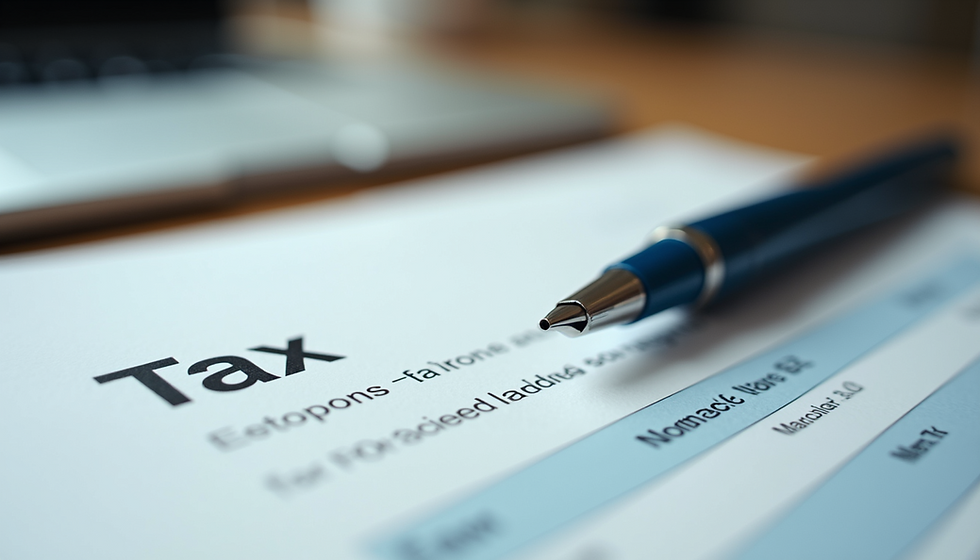Understanding Business Expenses: The Truth Behind Common Myths
- Eduard husaru
- Jul 22, 2025
- 3 min read
Updated: Nov 12, 2025
Myth 1: “HMRC Pays You Back for Expenses”
This is one of the most common misconceptions. HMRC does not reimburse you for business expenses. Instead, expenses reduce your taxable profit, which in turn lowers the amount of tax you owe.
Think of it like this:
You earn £30,000 in business income.
You have £5,000 in allowable expenses.
You’re only taxed on £25,000, not £30,000.
So while you don’t get a rebate for the £5,000, you pay less tax because your profit is lower.
Myth 2: “You Can Claim Everything You Spend”
Not quite. HMRC only allows expenses that are “wholly and exclusively” for business purposes. That means:
No personal clothing (unless it’s a uniform or protective gear).
No daily lunch costs (unless you’re travelling for business).
No client entertainment (meals, drinks, gifts).
Claiming non-allowable expenses can lead to penalties, interest, or even investigation.
Myth 3: “Cash Payments Aren’t Claimable”
Wrong again. You can pay for business expenses in cash—as long as you keep proper records. HMRC accepts cash payments if:
The expense is legitimate.
You have a receipt or clear documentation.
Myth 4: “You Can Claim Mileage and Fuel Together”
If you use HMRC’s approved mileage rate (e.g. 45p per mile for the first 10,000 miles), you cannot also claim fuel, insurance, or repairs separately. These costs are already built into the mileage rate.
You must choose:
Mileage method (simpler).
Actual cost method (more complex, requires detailed records).
What Are Business Expenses?
Business expenses—also called allowable expenses—are costs you incur solely for running your business. Common examples include:
Office supplies and software.
Travel to client meetings.
Professional fees (e.g. accountant).
Marketing and advertising.
Business insurance.
Phone and broadband (business portion only).
How Are Expenses Used in Your Tax Return?
When you file your Self Assessment:
You report your total income.
You subtract your allowable expenses.
HMRC calculates tax on the remaining profit.
You don’t need to submit receipts, but you must keep them for at least 5 years in case HMRC asks.
How Expenses Reduce Tax Liability: Real Examples
Let’s say you’re a sole trader with £40,000 in income.
Scenario A: No Expenses Claimed
Taxable profit: £40,000.
Income Tax: £40,000 – £12,570 (personal allowance) = £27,430.
Tax due: 20% of £27,430 = £5,486.
Class 4 NI: approx. £1,400.
Total tax: £6,886.
Scenario B: £8,000 in Allowable Expenses
Taxable profit: £32,000.
Income Tax: £32,000 – £12,570 = £19,430.
Tax due: 20% of £19,430 = £3,886.
Class 4 NI: approx. £1,100.
Total tax: £4,986.
Tax Saved: £1,900.
The Importance of Accurate Record Keeping
Keeping accurate records is crucial for any business. It helps you track your income and expenses effectively. This practice not only aids in preparing your tax return but also ensures you can substantiate your claims if HMRC requests evidence.
Common Mistakes to Avoid
Many small business owners make mistakes when claiming expenses. Here are a few common pitfalls to avoid:
Mixing Personal and Business Expenses: Always keep personal and business expenses separate. This will simplify your accounting and reduce the risk of errors.
Failing to Keep Receipts: Without receipts, you may struggle to prove your expenses. Make it a habit to keep all receipts related to your business.
Claiming Non-Allowable Expenses: Familiarise yourself with what can and cannot be claimed. This knowledge will help you avoid penalties.
Conclusion: Empowering Your Business with Knowledge
Business expenses aren’t a refund—they’re a powerful tool to reduce your tax bill. But only if you:
Claim what’s truly allowable.
Keep accurate records.
Understand how they affect your profit.
At Accounted 4 Tax Ltd, we help sole traders and small business owners navigate expenses with confidence—so you stay compliant and never overpay.
Need help reviewing your expenses or unsure what you can claim? Let’s chat.



Comments